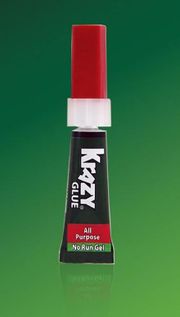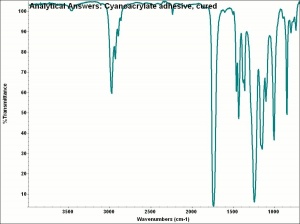Difference between revisions of "Krazy glue"
| (10 intermediate revisions by 2 users not shown) | |||
| Line 1: | Line 1: | ||
| + | [[File:KrazyGlue.jpg|thumb|Krazy Glue All Purpose No Run Gel]] | ||
== Description == | == Description == | ||
| − | [Elmer's] A registered trademark for a [[cyanoacrylate resin|cyanoacrylate]] adhesive. Krazy Glue contains 99.95% ethyl cyanoacrylate and 0.05% acrylic.Krazy Glue is a clear, colorless liquid before curing. Cyanoacrylates are quickly polymerized by exposure to moisture and ultraviolet light. When cured, it forms an extremely strong bond that is fairly insoluble. Cyanoacrylate glues has been used for gluing glass, ceramics and other hard materials. They also have medical and dental applications to suture skin and weld crowns. Some cyanoacrylate glues may lose adhesive strength with time. Ultraviolet light and contact with alkaline materials (glass and some stones) will accelerate the degradation process. | + | [Elmer's] A registered trademark for a [[cyanoacrylate resin|cyanoacrylate]] adhesive. Krazy Glue contains 99.95% ethyl cyanoacrylate and 0.05% acrylic. Krazy Glue is a clear, colorless liquid before curing. Cyanoacrylates are quickly polymerized by exposure to moisture and ultraviolet light. When cured, it forms an extremely strong bond that is fairly insoluble. Cyanoacrylate glues has been used for gluing glass, ceramics and other hard materials. They also have medical and dental applications to suture skin and weld crowns. Some cyanoacrylate glues may lose adhesive strength with time. Ultraviolet light and contact with alkaline materials (glass and some stones) will accelerate the degradation process. |
| − | + | [[[SliderGallery rightalign|aaiCYANOacrylate.jpg~FTIR]]] | |
== Synonyms and Related Terms == | == Synonyms and Related Terms == | ||
| Line 8: | Line 9: | ||
== Applications == | == Applications == | ||
| − | + | * Adhesive | |
| − | == Risks == | + | == Personal Risks == |
| − | + | * Causes eye irritation and may cause allergic skin reaction and respiratory irritation. | |
| + | * Suspected of damaging fertility or the unborn child. | ||
| + | * Will adhere objects on contact, including skin. | ||
| + | * Elmer's: [https://s7d9.scene7.com/is/content/NewellRubbermaid/DASH/S7_int/2020/KrazyGlue_SDS_All-Purpose%20Glue%20Series%28SDS-79%29.pdf SDS] | ||
| − | + | == Collection Risks == | |
| + | * May polymerize when heated, unstable at elevated temperatures. | ||
| + | * Containers may rupture or explode when exposed to heat. | ||
| + | * Avoid contact with water or moisture. | ||
| + | * Avoid contact with light. | ||
| + | * Oxides of carbon are hazardous decomposition products of Krazy Glue. | ||
== Physical and Chemical Properties == | == Physical and Chemical Properties == | ||
| − | Uncured glue soluble in acetone and methanol. Cured glue is slightly soluble in DMF or nitromethane. Soaking in acetone may decrease adhesion and cause the join to separate. | + | Uncured glue soluble in acetone and methanol. Cured glue is slightly soluble in DMF or nitromethane. Soaking in acetone may decrease adhesion and cause the join to separate. <ref> [https://www.krazyglue.com/faq Krazy Glue FAQ: What do I do if my fingers get stuck?] </ref> |
| + | |||
| + | == Working Properties == | ||
| + | Incompatible with alcohols, amines, and bases. Krazy Glue does not work well with paper, foam, polyethylene, Teflon, or other fluorocarbons. <ref> [https://www.krazyglue.com/faq Krazy Glue FAQ: Is there anything Krazy Glue can't bond?] </ref> | ||
| + | |||
| + | Water vapor is the catalyst that activates the Krazy Glue bond, so keeping the cap on the tube when not in use is essential. <ref> [https://www.krazyglue.com/faq Krazy Glue FAQ: How can I prolong the use life of my Krazy Glue tube?] </ref> A tight bond is formed within about 10 to 30 seconds and Krazy Glue does not expand as it cures, so clamps are not necessary. Surfaces need to be free from dirt, grease, or oil so that a strong bond can form. | ||
| + | |||
| + | == Forms and Sizes == | ||
| + | {| class="wikitable" | ||
| + | |+Product information from Krazy Glue: <ref>[https://www.krazyglue.com/ Krazy Glue Home Page]</ref> | ||
| + | |- | ||
| + | !All Purpose: | ||
| + | |Works on wood, rubber, glass, metal, plastic, and ceramic | ||
| + | |- | ||
| + | !Gel: | ||
| + | |“No-run” formula; useful for filling gaps on porous surfaces or gluing together mismatched surfaces. | ||
| + | |- | ||
| + | !Maximum Bond: | ||
| + | |Extra strong, durable shock-resistant bond | ||
| + | |- | ||
| + | !Craft: | ||
| + | |Made for use on materials such as ceramic, porcelain, and wood | ||
| + | |- | ||
| + | !Wood: | ||
| + | |Formulated for porous wood including maple, pine, birch, red oak | ||
| + | |} | ||
| + | |||
| + | Krazy Glue also has a variety of tips, brushes, and applicators. | ||
| − | + | Sold in small tubes, sizes vary from 0.07-0.52 oz. depending on formula and applicator type. | |
| + | == Resources and Citations == | ||
| + | <references/> | ||
| + | * Kaela Nurmi, contributed information, MWG group, 2020. | ||
| + | * Elmer's Krazy Glue [https://www.krazyglue.com/ Website] | ||
* C.V.Horie, ''Materials for Conservation'', Butterworth-Heineman, London, 1997 | * C.V.Horie, ''Materials for Conservation'', Butterworth-Heineman, London, 1997 | ||
| Line 29: | Line 69: | ||
| − | + | [[Category:Materials database]][[Category:MWG]][[Category:Adhesives]][[Category: Adhesive: Contact]] | |
| − | [[Category:Materials database]] | ||
Latest revision as of 09:13, 6 October 2022
Description
[Elmer's] A registered trademark for a cyanoacrylate adhesive. Krazy Glue contains 99.95% ethyl cyanoacrylate and 0.05% acrylic. Krazy Glue is a clear, colorless liquid before curing. Cyanoacrylates are quickly polymerized by exposure to moisture and ultraviolet light. When cured, it forms an extremely strong bond that is fairly insoluble. Cyanoacrylate glues has been used for gluing glass, ceramics and other hard materials. They also have medical and dental applications to suture skin and weld crowns. Some cyanoacrylate glues may lose adhesive strength with time. Ultraviolet light and contact with alkaline materials (glass and some stones) will accelerate the degradation process.
Synonyms and Related Terms
Krazy glue; crazy glue (sp); cyanoacrylate
Applications
- Adhesive
Personal Risks
- Causes eye irritation and may cause allergic skin reaction and respiratory irritation.
- Suspected of damaging fertility or the unborn child.
- Will adhere objects on contact, including skin.
- Elmer's: SDS
Collection Risks
- May polymerize when heated, unstable at elevated temperatures.
- Containers may rupture or explode when exposed to heat.
- Avoid contact with water or moisture.
- Avoid contact with light.
- Oxides of carbon are hazardous decomposition products of Krazy Glue.
Physical and Chemical Properties
Uncured glue soluble in acetone and methanol. Cured glue is slightly soluble in DMF or nitromethane. Soaking in acetone may decrease adhesion and cause the join to separate. [1]
Working Properties
Incompatible with alcohols, amines, and bases. Krazy Glue does not work well with paper, foam, polyethylene, Teflon, or other fluorocarbons. [2]
Water vapor is the catalyst that activates the Krazy Glue bond, so keeping the cap on the tube when not in use is essential. [3] A tight bond is formed within about 10 to 30 seconds and Krazy Glue does not expand as it cures, so clamps are not necessary. Surfaces need to be free from dirt, grease, or oil so that a strong bond can form.
Forms and Sizes
| All Purpose: | Works on wood, rubber, glass, metal, plastic, and ceramic |
|---|---|
| Gel: | “No-run” formula; useful for filling gaps on porous surfaces or gluing together mismatched surfaces. |
| Maximum Bond: | Extra strong, durable shock-resistant bond |
| Craft: | Made for use on materials such as ceramic, porcelain, and wood |
| Wood: | Formulated for porous wood including maple, pine, birch, red oak |
Krazy Glue also has a variety of tips, brushes, and applicators.
Sold in small tubes, sizes vary from 0.07-0.52 oz. depending on formula and applicator type.
Resources and Citations
- Kaela Nurmi, contributed information, MWG group, 2020.
- Elmer's Krazy Glue Website
- C.V.Horie, Materials for Conservation, Butterworth-Heineman, London, 1997
- G.S.Brady, Materials Handbook, McGraw-Hill Book Co., New York, 1971
- Irving Skeist, Handbook of Adhesives, Van Nostrand Reinhold Company, New York, 1977

